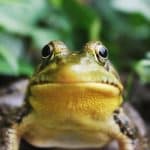~1450 words, ~10 minutes reading time
At the Barrazza cafe in Ghent, you must be so close to the water that you become one with it. The circling midges are your thoughts; you are their bar and they drink cherry beer from your bloodstream. The thoughts come and go, never landing. The canal is a mirror. Above you there is a respectable burble of other languages. The moorhen has been there all the while, bobbing back and forth. Now there is an intimacy between you. You wanted to be close to the water. No need to look up at the old warehouses with their grain winches, no need to lift weary eyes to the sky. The weather is spread out at your feet.
Only.
Is that blue in the water the same blue as the sky? It looks slightly different, not just a shade darker, but a touch more lilac, as though infused with something. No moon-ghost, yet it seems to promise whole new moons, planets with rings, star-tunnels to worlds of light.
The moorhen marrs the mirror.
“You’re a jumper, aren’t you?” it says, cocking its head in a way that makes you touch your cheek self-consciously. Can it see the blush of alcohol? By rights the bird should not expect an answer, since it should not be speaking, but to stay silent would insult a miracle of nature.
“A jumper?” The word unravels in your mind. “How do you mean?”
“You’ve already spotted the other sky.”
At once you understand. Here, the idea of jumping contains no notion of plunging into water, only launching into that other sky.
“It works, but it may not work out.” The moorhen goes on, blinking its little black eyes. “You don’t know what you’ll find in an unfamiliar sky. Plus…” it says, “plus… there can be a lot of crap in canals.”
Like a forbidden door that has only just appeared, a drug you would never normally dream of taking, it becomes real all at once. Words give the idea a rickety, stick-man-like presence. You could snap them and let out their essence.
“Anyway, I have hay to collect in my beak. Don’t say I didn’t warn you.”
Throw in a talking moorhen, and the effect is even more potent. As the bird swims away, it seems so possible to jump, suddenly. Just jump. The depth is staggering. Even the houses lean towards the canal, as though tempted – over the centuries – to topple into that blue sky and release their bricks. Beyond those roofs with their high trapdoors, grain hooks, dormer windows and black beams, there is the promise of something infinite, manifold, amorphous. What makes a person want to jump into the celestial blue yonder? It is a moment, not a plan. The sky promises different rules, not the tyranny of roads and roundabouts and all the constraints of land.
Being a bus driver builds up in your arteries, like any job. Technically you enjoy driving and can relax. No need to rush, no problem if there is traffic because you’re not really trying to get anywhere. The journey is all that matters, the destination non-existent. When you reach the end of your route, you simply turn the bus around. Maybe you get out and have a cuppa or a rollie if there is time. Fair enough, you gain a wafer of satisfaction with each completed run but, in general, direction loses its potency.
The only reason you are in Ghent is that you took one form of public transport after the next. The only reason you are at this bar is because it is right next to the canal, Ghent’s transport network. Travel along the river for a day and you’ll be in France. Go up that medieval waterway over there and you’ll reach the sea. Ghent is a place with real directions, real choices.
If you jumped into the canal, the other drinkers would stand up in alarm. Drunken tourist! But it wouldn’t be an accident. The point would be to land in the blue sky – you’d need a slight run-up. The moorhen glances back from across the water, muttering. But consider the alternative: going back the way you came. Turning the bus slowly at Liset Cross. Here, you can’t turn back. It is an edge-of-the-world situation.
There is no run-up to be had, so you use your arms for momentum. The mirror smashes. Cold, but no wetness. Cold like a night sky. Is it dust or stars cascading down? A small headache must be the light pulling sensation of space – the vacuum. Have you reached the blue lilac? There is a nonsensical odour of ale-soaked wood, barley and malt. An elderly man is sprinkling sawdust in front of your eyes. There is thatch between the rafters, and for an instant you perceive dry, raisin-like faces in it. The old man’s nose is too long and his wart is cartoonish, his eyes watery green and protruding from their rims. He giggles and your head swims. This soft darkness is the fleece of a black sheep, spread on the floor. The only light filters through a broken shutter in a dormer window. He spreads sawdust liberally over your body.
“Dry it out,” he coos, “dry away that nasty old life, we don’t want canal stink on you.” You are not wet. Batting him off, you struggle to your feet. The musty smells of the loft are comforting, and through the cracked window the lilac sky still looks inviting. But if you peer downwards there are the lower sections of this house, and then the water, and another less crooked but identical house growing up on the other side. You have made a grave mistake.
“Yes,” snickers the old man. “They miss! You miss!”
How is it possible? The shutter swings open and shut, like a trapdoor, and at once you picture your leap into the water, the difficulty of judging exactly what was below. There is a clink, a coldness biting your ankle.
“Nearly forgot,” says the man. “You stay with me now till you dry out, then you make nice insulation like the rest of them.” He gestures to the ceiling, to where straw-coloured faces are wizened and wrinkled, their garb mostly dresses from period dramas.
The panic is all-consuming. Surely you can get past an old man. He massages some sawdust soothingly into your skin. “You wanted the great wide yonder, but you didn’t quite make it,” he purrs. “Never mind. I will desiccate you and use you in my roof, but I’ll tell you what would have happened had you leaped more accurately and made it to the sky. And I’ll tell you with such vivid detail that you’ll be able to experience it perfectly in your mind’s eye. Eh? How about that?”
The smell of dust gets up your nose, just like when you were checking the musty seats of the bus on a warm day.
“Does anyone make it?”
He ignores this.
“Picture yourself falling,” he says, “feeling the light touch on your skin, in your soul, as you meld with the watery blue, a lilac blue, a colour more dense than air, so you float as much as you fall. It allows your thrashing to get you somewhere. You drift up a little way and see the whole universe spread out below. You have so much choice. Below are the downward houses, the chimneys… but you can move onward into the blue and see other civilisations clustered on planets but reachable, just faded slightly like daytime moons. In these clusters you will find elfin creatures, near humans, ideas of humans, waterfalls, animals, and you can move further into the firmament, like walking on water.”
His talk is a torrent, unceasing and heedless of time. It is so easy to travel from planet to planet. Go round the rings and they will slingshot you onwards. He describes tribes with heads like daffodils, proud and yellow.
When someone crosses the water they separate. Only a part of you comes here, he says. The other part is back on the bus, orbiting roundabouts. Driven by all the diesel in the universe. Cheers drive, thanks a lot and you look over and the old man’s getting off the bus and you’re travelling on to the next roundabout. Islands, they call them in other countries. Did he say that?
Your skin is dry, a little wisp of you going with him to fix up his attic, but these islands give your journey the shape of a destination. On this one the inhabitants have heads like tulips, fat and berry-sour and impossibly indigo. You build up speed to reach the next. Round and round you go.
Heather Child is based in Bristol, UK, and is an author of mostly speculative fiction. Her debut novel was Everything About You (Orbit, 2018) and her most recent book, The Undoing of Arlo Knott, is about a man who can undo his last action – like having an ‘undo’ button for life.
Photo by Ricardo Gomez Angel on Unsplash






